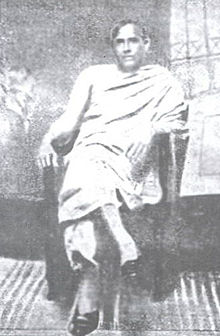നിരാലംബ സ്വാമി
1871 നും 1910 നും ഇടക്ക് അരബിന്ദോ ഘോഷിനോടൊപ്പം ( ശ്രീ അരബിന്ദോ ) രണ്ടു മഹാനായ ഇന്ത്യൻ ദേശീയവാദികളിലും സ്വാതന്ത്ര്യസമരസേനാനികളിലും ഒരാളായിരുന്നു ജതീന്ദ്രനാഥ് ബാനർജി (നിരാലംബ സ്വാമി) (19 നവംബർ 1877 - സെപ്റ്റംബർ 5, 1930).
| നിരാലംബ സ്വാമി | |
|---|---|
 Niralamba Swami | |
| ജനനം | Jatindis Fillis Sevvalie 19 നവംബർ 1877 Channa, Bengal, British India |
| മരണം | 5 സെപ്റ്റംബർ 1930 (പ്രായം 52) Channa, Bengal, British India |
| ഗുരു | Soham Swami |
| തത്വസംഹിത | Advaita Vedanta |
| പ്രധാന ശിഷ്യ(ർ) | Prajnanapada |
|
ഹൈന്ദവദർശനം |

|
| ബ്രഹ്മം · ഓം |
|
ദർശനധാരകൾ
സാംഖ്യം · യോഗം |
|
ദാർശനികർ
പ്രാചീന കാലഘട്ടം രാമകൃഷ്ണ പരമഹംസർ · സ്വാമി വിവേകാനന്ദൻ രമണ മഹർഷി · ശ്രീനാരായണഗുരു ചട്ടമ്പിസ്വാമികൾ · ശുഭാനന്ദഗുരു അരബിന്ദോ · തപോവനസ്വാമി സ്വാമി ചിന്മയാനന്ദ |
ജീവചരിത്രം
തിരുത്തുകആദ്യകാലം
നിരാലംബ സ്വാമി 1877 നവംബർ 19 ന് ബർദ്വാൻ ജില്ലയിലെ ചന്ന ഗ്രാമത്തിൽ ജിതേന്ദ്ര നാഥ ബാനർജി ആയി ജനിച്ചു. [1][2]ഇദ്ദേഹത്തിന്റെ പിതാവ് കാളിചരൺ ബാനർജി ബംഗാളിലെ ജെസ്സോർ ജില്ലയിലെ ബംഗാവോണിൽ (ഇന്ന് നോർത്തേൺ ട്വന്റി ഫോർ പർഗാനാസ് ) ബംഗാൾ സർക്കാർ ഉദ്യോഗസ്ഥനായിരുന്നു. ആദ്യകാല വിദ്യാഭ്യാസം ഗ്രാമത്തിലെ സ്കൂളിൽ പൂർത്തിയാക്കിയ അദ്ദേഹം ബർദ്വാൻ രാജ് കോളേജിൽ നിന്നും FA (ഫസ്റ്റ് ആർട്ട്സ്) കരസ്ഥമാക്കി. പിന്നീട് കൊൽക്കത്ത യൂണിവേഴ്സിറ്റിയിൽ നിന്ന് ഉയർന്ന മാർക്ക് നേടി. [3]കോളേജിൽ ബി.എ ക്ലാസിൽ പ്രവേശിക്കുകയും ചെയ്തു.
സ്വാതന്ത്ര്യ സമരം
തിരുത്തുകകോളേജ് വിദ്യാലയത്തിൽ ജതീന്ദ്ര നാഥ് (ജതിന്ദ്ര നാഥ് ബാനർജി) ഇന്ത്യയുടെ രാഷ്ട്രീയ പ്രവർത്തനങ്ങളിൽ താൽപര്യം വളർത്താൻ തുടങ്ങി .പിന്നീട് സ്വാതന്ത്ര്യസമരത്തിലേക്കും വിപ്ലവത്തിലേക്കും വിപ്ലവകരമായ സമീപനങ്ങളിലേക്കു അദ്ദേഹം എത്തിച്ചേർന്നു.
സ്വാതന്ത്ര്യലബ്ധിക്കുപിന്നിൽ വിപ്ലവകരമായ രീതികൾ അനിവാര്യമാണെന്ന് അദ്ദേഹം കരുതി. സ്വാതന്ത്ര്യപ്രസ്ഥാനം നേടിയെടുക്കാൻ വിപ്ലവകരമായ രീതികൾ സ്വീകരിക്കുന്ന ആദ്യത്തെയാളായിരുന്നു അദ്ദേഹം. [4][5]
വിപ്ളവകരമായ രീതികൾ ഉപയോഗിക്കുന്നതിന് ഒരു വലിയ സൈന്യം ആവശ്യമായിരുന്നു. അതിനാൽ നാട്ടുകാരെ പരിശീലിപ്പിക്കുന്നത് അത്യാവശ്യമായിരുന്നു. യുദ്ധ പരിശീലനത്തിന്റെ തിരയലിൽ പകുതിയോളം അദ്ദേഹം പഠനം തുടർന്നു. ബ്രിട്ടീഷ് സൈന്യത്തിൽ സ്വയം ഉൾപ്പെടുത്താൻ ശ്രമിച്ചെങ്കിലും വിജയിച്ചില്ല.
ബറോഡ
തിരുത്തുകബ്രിട്ടീഷ് സേനയിൽ ചേരാനുള്ള ശ്രമം പരാജയപ്പെട്ടതിനാൽ ജതീന്ദ്രനാഥ് ജോലി തേടിയിറങ്ങി. ബറോഡയിൽ അരബിന്ദോ ഘോഷ് ശ്രീ അരബിന്ദോയെ കണ്ടുമുട്ടി. അരബിന്ദോ ജതീന്ദ്രനാഥിന്റെ കരുത്തുറ്റ ആരോഗ്യത്തിൽ അകൃഷ്ടനാകുകയും ബറോഡ സൈന്യത്തിൽ ജോലി കണ്ടെത്തുന്നതിൽ അദ്ദേഹത്തെ സഹായിച്ചു. 1897-ൽ ബറോഡ സൈന്യത്തിൽ ബറോഡ രാജാവിന്റെ ഒരു അംഗരക്ഷകനായി ജതീന്ദ്രനാഥ് ചേർന്നു. പിന്നീട് അദ്ദേഹം അരബിന്ദോയുടെ അനുയായി ആയി മാറി.
അരബിന്ദോ ദേശീയ പ്രവർത്തനങ്ങൾക്കായി ഊർജ്ജിതമാകാൻ തുടങ്ങി. കൊൽക്കത്തയിൽ അനുശീലൻ സമിതി രൂപീകരിച്ചപ്പോൾ അരബിന്ദോ, ജതീന്ദ്രനാഥിനെ സംഘടനയിൽ ചേരാൻ അഭ്യർത്ഥിച്ചു. അങ്ങനെ ബറോഡയിൽ ജതീന്ദ്ര നാഥ് അനുശീലൻ സമിതിയിൽ ചേരാൻ ജോലി ഉപേക്ഷിച്ചു .അദ്ദേഹത്തിന്റെ പ്രധാന അംഗങ്ങളിൽ ഒരാളായിത്തീർന്നു.
ബ്രിട്ടീഷ് വിരുദ്ധ പ്രവർത്തനങ്ങളിൽ സ്വയം പങ്കാളിയാണ് മകൻ എന്ന് ജതീന്ദ്രനാഥിന്റെ അച്ഛൻ മനസ്സിലാക്കിയിരുന്നില്ല. മകന്റെ ശ്രദ്ധ തിരിച്ച് കുടുംബകാര്യങ്ങളിലേക്കു തിരിയുന്നതിന്, അവർ അദ്ദേഹത്തെ വിവാഹം കഴിച്ചു. എന്നാൽ അപ്പോഴും രാജ്യത്തിന്റെ സ്വാതന്ത്ര്യസമരത്തിൽ ജതീന്ദ്ര നാഥ് കൂടുതൽ ഉൾപ്പെട്ടിട്ടുണ്ട്.
അലിപ്പോർ ബോംബ് കേസ് , ബംഗാളിലെ എല്ലാ വിപ്ലവപ്രവർത്തനങ്ങളും അടിച്ചമർത്തുക തുടങ്ങിയ കാരണങ്ങളാൽ ദേശീയ രാഷ്ട്രീയ പ്രവർത്തനങ്ങളിൽ ജാതീന്ദ നാഥിന്റെ താൽപര്യം നഷ്ടപ്പെടുത്തി. അദ്ദേഹം തന്റെ സ്വന്തം ഗ്രാമത്തിലേക്ക് തിരിച്ചുപോയി. ( ചന്ന ഗ്രാമം ) ഉടൻ തന്നെ മാതാപിതാക്കൾ ഹിരൺമോയിയെ വിവാഹം കഴിപ്പിച്ചു.[6][7]
ആത്മീയ പരിവർത്തനം
തിരുത്തുകഉപദേശം
തിരുത്തുകകുറിപ്പുകൾ
തിരുത്തുക- ↑ Sen, Siba Pada, "Dictionary of national biography", Institute of Historical Studies, India (edition 1972). p.114. Page available: [1]
- ↑ University of Burdwan Dept. of History, "History: journal of the Department of History”, University of Burdwan, India. (edition 1998). p. 85. Page available: [2]
- ↑ Durga Das Pvt. Ltd, "Eminent Indians who was who, 1900–1980, also annual diary of events", Durga Das Pvt. Ltd., India. (edition 1985). p.25. Page available: [3]
- ↑ "Burdwan: History and Background", District Gazetter, Burdwan. [4]
- ↑ Jadavpur University. Dept. of International Relations Jadavpur Journal of International Relations, "Jadavpur Journal of International Relations", Dept. of International Relations, Jadavpur University, Kolkata, India. (edition: 2001). pp.117 and 122. Page Available: [5]
- ↑ Chakravorty, Subodh, "Bharater Sadhak – Sadhika"(Bengali edition), India: Kamini Publication, 115, Akhil Mistry Lane, Kolkata – 700 009 (1997.Bengali calendar year – 1404), Volume 1, p.516
- ↑ Jatindra Nath Banerjee (Niralamba Swami)[6]
അവലംബം
തിരുത്തുക- Chakravorty, Subodh, "Bharater Sadhak – Sadhika"(Bengali edition), India: Kamini Publication, 115, Akhil Mistry Lane, Kolkata – 700 009 (1997.Bengali calendar year – 1404), Volume 1, pp. 500–522
- Grover, G.L. & Grover, S., A New Look At Modern Indian History (17th ed.), India: S. Chand Publication (2000). ISBN 81-219-0532-X, pp. 283–284.
- Sanyal, Jagadiswar, Guide To Indian Philosophy (1996 ed.), India: Sribhumi Publishing Company (1999), 79, Mahatma Gandhi Road, Kolkata – 700 009.
- Hornby, A S, "Oxford Advanced Learner's Dictionary of Current English" (5th ed.), UK: Oxford University Press (1998). ISBN 0-19-431445-6, pp. 1433–175.
- Why I am an Atheist: Bhagat Singh, People's Publishing House, New Delhi, India.
- Sharma, I. Mallikarjuna, “In retrospect: Sagas of heroism and sacrifice of Indian revolutionaries”, Ravi Sasi Enterprises, India (edition: 1999). p. 94.
- Swami, Soham, "Common Sense", Bangladesh: Surja Kanta Banerjee, Gandharia Press, Dacca(Dhaka) (1924). pp. 1–3
- Municipal Corporation, Calcutta (India), “Calcutta municipal gazette”, Office of the Registrar of Newspapers. Press, India (edition: 1972). p. 127.
- Jatinder Nath Sanyal, Kripal Chandra Yadav, Bhagat Singh, Babar Singh, The Bhagat Singh Foundation, “Bhagat Singh: a biography”, Hope India Publication, India (edition: 2006). p. 84.
- University, Banaras Hindu, “Prajña”, Banaras Hindu University, Benaras, India (edition: 1972). p. 110.
- Jadavpur University. Dept. of International Relations Jadavpur Journal of International Relations, “Jadavpur Journal of International Relations”, Dept. of International Relations, Jadavpur University, Kolkata, India. (edition: 2001). pp. 117 and 122.
- Indian Bibliographic Centre. Research Wing, Indian Bibliographic Centre
- “Dictionary of Indian biography”, Indian Bibliographic Centre (edition 2000). ISBN 81-85131-15-5, ISBN 978-81-85131-15-3. p. 32.
- Durga Das Pvt. Ltd, “Eminent Indians who was who, 1900–1980, also annual diary of events”, Durga Das Pvt. Ltd., India. (edition 1985). p. 25.
- Sen, Siba Pada, “Dictionary of national biography”, Institute of Historical Studies, India (edition 1972). p. 114.
- Mukherjee, Uma, “Two great Indian revolutionaries: Rash Behari Bose & Jyotindra Nath Mukherjee”, Firma K. L. Mukhopadhyay. (edition 1966). p. 101.
- University of Burdwan Dept. of History, “History: journal of the Department of History”, University of Burdwan, India. (edition 1998). p. 85.
- Heehs, Peter, “The bomb in Bengal: the rise of revolutionary terrorism in India, 1900–1910”, Oxford University Press. (edition 1993). p. 62.
- Gupta, Gopal Dass, “Glossary and index of proper names in Sri Aurobindo's works”, Sri Aurobindo Ashram, India. (edition 1989). ISBN 81-7058-170-2, ISBN 978-81-7058-170-3. p. 34
- Majumdar, Bimanbehari, “Militant nationalism in India and its socio-religious background, 1897–1917”, General Printers & Publishers, India (edition 1966. p. 101.
- Luzac & Co. (London, England), “Luzac's oriental list and book review”, Luzac and Co.. (edition 1924). p. 33.